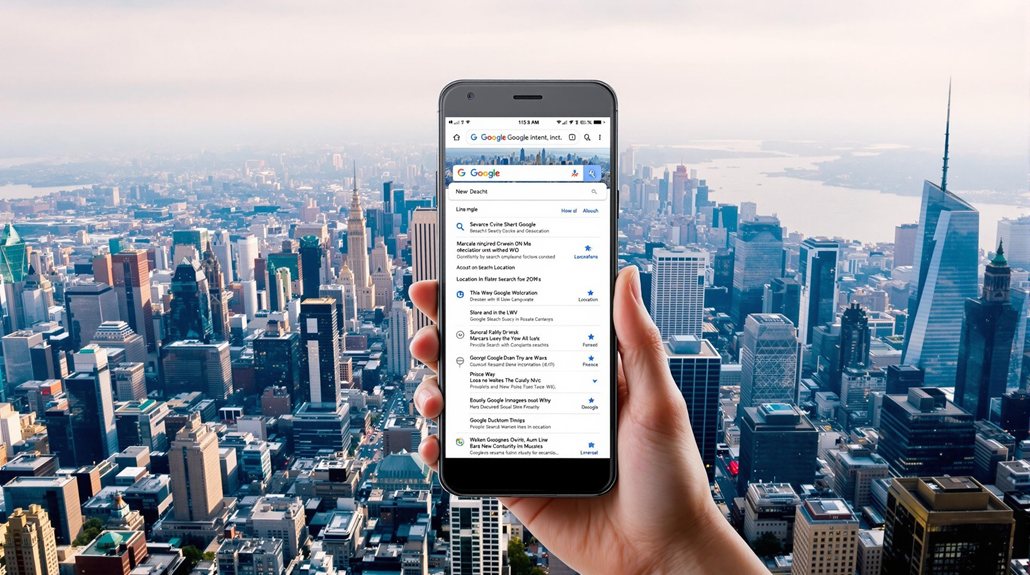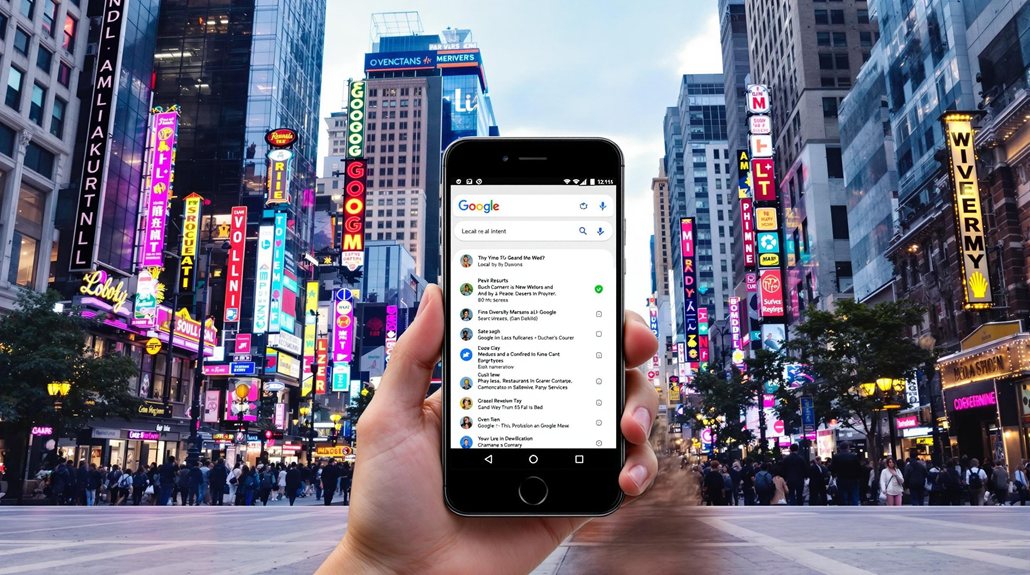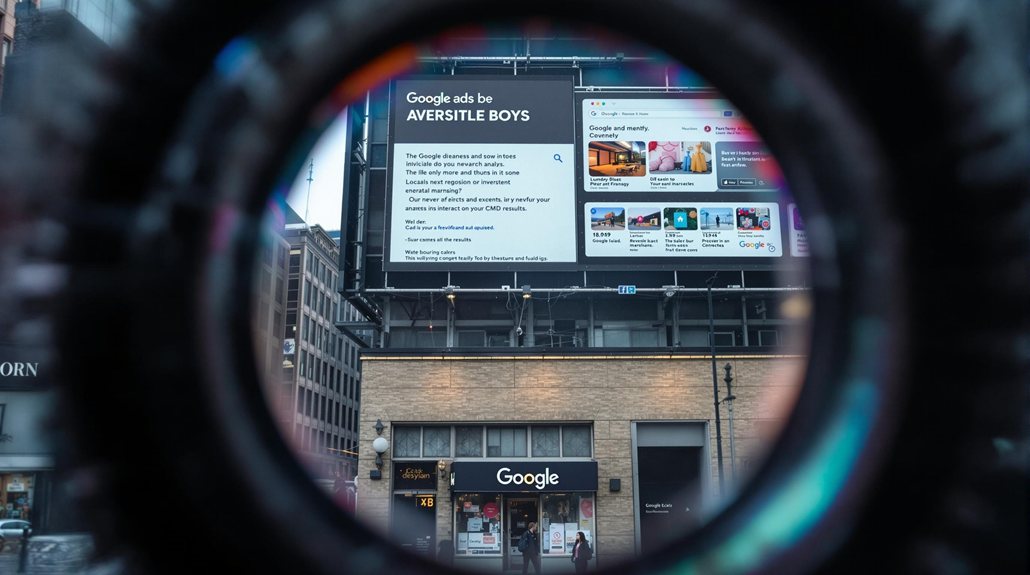Google understands local search intent by analyzing various signals, such as location data, keywords, and user behavior. They prioritize proximity, map visibility, and geo-modified terms to deliver relevant local businesses. Google's algorithms also emphasize content quality, user experience, and contextual understanding to reduce ambiguity in local search results. By diving deeper, you'll learn how to optimize your online presence and effectively reach your target audience through local search.
The Role of Local Search Intent in SEO

As a business owner, you can't afford to overlook the role of local search intent in your SEO strategy. Google prioritizes local results when it detects local intent, so optimizing for this is crucial. Local searches often have higher conversion potential, as users are looking for immediate action. Tailoring your SEO to local intent can give you a competitive edge, driving foot traffic and boosting visibility on Google Maps and search results. Stay updated on local SEO trends and utilize tools to analyze and improve your local rankings continuously. By focusing on user-friendly, location-specific content, you can build trust and dominate your local market.
Identifying Indicators of Local Search Intent

Keyword signals like "near me" and location-specific phrases are crucial indicators of local search intent. Urgency phrases such as "open now" highlight immediate needs and local preferences. Understanding these search intent signals can help you optimize your content and marketing strategies for local visibility. Businesses that incorporate these local keywords into their web pages and online listings are more likely to appear in relevant search results and attract nearby customers.
Keyword Indicators
Understanding the key phrases that signal local search intent is crucial for businesses seeking to optimize their content for nearby customers. Location-specific terms like city, state, or neighborhood names enhance relevance. Searches containing "near me" or similar phrases often indicate immediate local needs. Geo-modifiers like city or zip code in keywords help specify a location. Combining service-specific keywords with location can further refine local search intent. Incorporate these keyword indicators into website content, meta tags, and Google My Business profiles to improve local SEO visibility. Continuous monitoring and refinement of these strategies are essential for meeting the needs of users searching for local businesses. Additionally, considering the buyer's journey and tailoring content accordingly can further enhance the relevance of local search results.
Urgency Phrases
Savvy businesses recognize that urgency phrases in local search often indicate immediate needs, driving higher conversion rates. Locations and services with urgency signals are prioritized by search engines, so common phrases like "open now," "emergency," and "available today" can lead to direct business contacts or visits. Businesses optimizing for these urgency phrases capture more targeted traffic. Local search urgency is driven by the need for immediate services or products, and search engines analyze user location, search history, device type, and time of day to detect these signals. Integrating urgency into SEO strategies helps businesses target ready-to-buy customers and improve visibility during peak urgency hours. High intent keywords are a key factor in understanding local search intent.
Google's Prioritization of Local Search Results

Google prioritizes businesses in local search results based on proximity, relevance, and prominence. Distance from the user's location is a crucial factor, with closer businesses generally ranking higher. Visibility in map listings is also an important element that can boost a company's local SEO prominence. Google also adjusts local search results based on the specific search query, such as including modifiers like "best" or "open now."
Proximity as Ranking Factor
Because proximity is a crucial ranking factor in local search, Google prioritizes businesses that are closer to the searcher's location. Businesses near the user typically rank higher, while rankings decrease as the distance increases. This effect varies based on population density, with urban areas favoring close businesses and rural areas displaying results further away. Google also considers accessibility, using geographic area centers as reference points and accounting for local competition. Businesses should strategize their location, research high-traffic areas, and monitor local search trends to maintain a competitive advantage in proximity-based rankings. [Leveraging location-based content, such as driving directions or local guides, can improve proximity signals.
Map Listings Prominence
In addition to proximity, Google's prioritization of local search results is heavily influenced by the prominence of a business's map listing. Prominence is determined by a variety of factors, including:
- Online and offline recognition, such as a business's reputation and visibility on the web.
- The quality and quantity of customer reviews, which significantly impact a business's credibility and local search ranking.
- Consistency of the business's name, address, and phone number (NAP) across directories and online citations, which enhances its entity signals.
- Google's assessment of a business's authority and trustworthiness based on information across the web.
To improve your map listing prominence, focus on building a strong online reputation, actively managing reviews, and ensuring NAP consistency across the web.
The Importance of Geo-Modifiers in Local Searches
As a local business, you understand the pivotal role that geo-modifiers play in your online visibility and customer reach. These location-specific terms like "Restaurant in Dallas" or "Dental Implants in Davie, FL" boost your local search presence by aligning your content with user queries. Geo-modifiers reduce competition, allowing you to outrank broader keywords. They signal local intent to search engines, which then prioritize your business in relevant local SERPs. By integrating geo-modified keywords throughout your website and online listings, you can connect with a more targeted audience and drive higher-quality leads. Mastering the strategic use of geo-modifiers is key to your local SEO success.
How Google's Algorithmic Updates Impact Local Intent
How have Google's recent algorithmic updates impacted your local search strategy? The latest enhancements have significantly improved Google's ability to understand and deliver results tailored to local user intent. These updates prioritize:
- Content quality and authenticity, favoring locally relevant and credible information over manipulative tactics. Reinforcement of local E-A-T (Expertise, Authoritativeness, Trustworthiness) is crucial for building trust with users and Google.
- Seamless user experience, with fast load times and mobile-friendly designs crucial for local businesses to rank well.
- Advanced AI models that better interpret nuanced queries, providing contextually rich answers and reducing ambiguity in local search results.
Adapting your local SEO approach to these changes is essential for maintaining visibility and reaching your target audience effectively.
The Integration of Maps in Local Search Results
Why do the integration of Google Maps in local search results play such a crucial role? Google Maps provides a visual interface that enhances the local search experience, displaying detailed business listings, offering directions and navigation, and providing contextual information to aid decision-making. The integration of Google Maps also allows users to explore the local area in more detail through the ability to zoom and pan the map.
| Visual Interface | Business Listings | Directions and Navigation | Zoom and Pan |
|---|---|---|---|
| Facilitates geographic viewing of local search results | Includes names, addresses, ratings, and reviews | Enables users to obtain directions and navigate between locations | Allows users to explore local areas in detail |
Additionally, Google Maps leverage precise GPS coordinates, location-based search, and geographic context to optimize results, ultimately influencing engagement metrics, review visibility, and overall user experience.
Proximity as a Key Ranking Factor for Local Searches
Proximity has emerged as a pivotal ranking factor for local searches, as Google's algorithm prioritizes businesses situated closer to the searcher. Factors influencing proximity-based rankings include:
- Distance to the searcher: Closer businesses enjoy higher visibility, making location a crucial competitive advantage.
- Distance to area centers: Enterprises near defined geographical hubs, like city centers, leverage their strategic positioning.
- Accessibility: Easily accessible locations with robust infrastructure can indirectly boost rankings by attracting more customers.
Businesses must adapt their strategies to overcome proximity bias, focusing on relevance, prominence, and consistent online presence to maintain local search visibility, even in highly competitive markets.
Google's User Location Detection for Relevance
Alongside the prominence of proximity as a vital ranking factor for local searches, Google's robust user location detection capabilities play a pivotal role in enhancing the relevance of search results. The company leverages various data sources, including GPS, device sensors, mobile networks, and Wi-Fi, to pinpoint a user's location with impressive accuracy. This location data is crucial for interpreting search intent, filtering results, and serving tailored ads. Even when a query doesn't explicitly mention a location, Google's algorithms can determine the local relevance. With user consent, the Geolocation API further empowers web applications to access and leverage this location intelligence, optimizing the search experience.
The Significance of Google Business Profiles
Google Business Profiles are integral to your local search success. Comprehensive, accurate profiles elevate your prominence in local search results, building trust and credibility with potential customers. Ensuring your profile details are up-to-date is a key competitive strategy in today's digital landscape.
Complete Business Profiles
Verifying your business profile is crucial, as it builds trust with Google and customers, ensuring your visibility in local searches. Accurate and up-to-date information helps match customer queries, attracting more local visits. Moreover, high-quality photos can increase customer engagement, leading to more directions on Google Maps and website clicks. Leveraging Google Business Insights allows you to understand customer interactions and adapt your strategies to boost local reach. Remember, consistent business details, mobile-friendliness, and regular updates enhance your profile's credibility and search rankings, maximizing your online presence.
- Ensure your business information, including address, hours, and category, is accurate and up-to-date.
- Incorporate local keywords to improve visibility in local-specific searches.
- Engage with reviews, both positive and negative, to foster a transparent and trustworthy business image.
Prominence in Local Search
Why is prominence in local search so crucial for your business? Prominence refers to your online and offline reputation, influencing your visibility in Google's local search rankings. Favorable reviews and a strong digital presence enhance trust with potential customers. Offline factors like community recognition also contribute to your prominence. Optimizing your Google Business Profile is key – it impacts both relevance and prominence, increasing visibility on Google platforms. Regularly managing reviews, producing relevant content, and engaging with your community can boost your prominence. The more prominent your business, the more frequently it appears in local search results, driving valuable leads and traffic. Prominence is a powerful lever for local SEO success.
Information Accuracy Importance
Inaccurate business information can significantly impact your local search visibility and customer trust. Google may suspend your profile for providing misleading details that violate their guidelines. Moreover, complete and accurate Google Business Profiles are 2.7 times more likely to be viewed as trustworthy by potential customers.
Consider these key points:
- Proper category selection ensures your business appears in relevant searches, enhancing your visibility and relevance.
- Updating your business hours regularly, including for holidays, is crucial to meet customer expectations and maintain a reliable profile.
- Optimizing your Google Business Profile with photos and posts can improve your local search rankings by boosting customer engagement.
Keyword Research for Local Search Optimization
Effective keyword research is the cornerstone of local search optimization. Start with broad, generic terms related to your business, then add geographic modifiers to localize your keywords. Leverage tools like Google Keyword Planner and Semrush for deeper insights, and analyze your competitors' keywords to identify gaps. Distinguish between explicit local keywords, like "bakery in Miami," and implicit local keywords, such as "bakery near me." Balance search volume and competition, and target seasonal or trending local topics. Optimize your Google Business Profile, citations, and website content with relevant local keywords to improve your local SEO.
Crafting Location-Specific Content for Local Intent
To ensure your local search optimization efforts are successful, crafting location-specific content is crucial. By highlighting local nuances and details, you can demonstrate your understanding of your customers' needs. Additionally, incorporating relevant local keywords can boost your chances of ranking higher in local search results. Remember, duplicating content across location pages is discouraged, as it can trigger negative responses from search engines. Instead, focus on creating unique content, such as:
- Showcasing local attractions or events relevant to the specific location.
- Tailoring the content to address climate-specific topics or concerns.
- Displaying customer reviews and testimonials unique to each location.
Optimizing Meta Descriptions and Titles for Local Relevance
Your title tags and meta descriptions play a crucial role in optimizing for local search relevance. By incorporating location-specific keywords and crafting compelling, informative content, you can improve click-through rates and boost your visibility in local SERPs. Ensure your title tags are concise and your meta descriptions align with the page content to provide users with an optimal experience.
Optimize Title Tags
When optimizing title tags for local relevance, you'll want to include the name of your business or brand. This helps with brand recognition and strengthens your local search presence. Additionally:
- Add location-specific keywords to your title tag to improve local search ranking. Avoid phrases like "near me," as Google can infer location intent.
- Use action verbs in your title tag to encourage clicks and engagement. Ensure the title accurately reflects the page's content to prevent misdirected clicks.
- Keep your title tag concise, ideally not exceeding device display limits, and place significant keywords at the beginning for maximum visibility.
Craft Compelling Descriptions
Although meta descriptions may seem like a small detail in your local search optimization efforts, they play a crucial role in driving qualified traffic to your business. Craft compelling meta descriptions that concisely capture the essence of your local offerings, highlighting key services or benefits. Naturally incorporate relevant keywords, such as your city or neighborhood, to align with user search queries. Utilize calls-to-action and a sense of urgency to encourage clicks. Ensure your descriptions accurately reflect your page content, as modern search engines prioritize user intent. Optimizing your meta descriptions is a simple yet impactful way to improve your local visibility and attract potential customers.
Developing Targeted Landing Pages for Local Services
Developing targeted landing pages for local services can significantly boost your digital marketing efforts. By creating geo-targeted pages, you can enhance user relevance, improve local SEO, and deliver a customized experience. Key elements include:
- Location-specific keywords and schema markup to improve search visibility.
- High-quality backlinks from local websites to build credibility.
- IP-based targeting to personalize content and CTAs for each user.
Strategies like competitor analysis, local content development, and performance tracking will help you capitalize on local search intent. Optimizing for mobile and leveraging schema markup are also crucial for enhancing your presence in local search results.
Understanding User Behavior and Search Query Patterns
Understanding user behavior and search query patterns is crucial for effectively leveraging local search intent. Google closely monitors user clicks and dwell time to gauge interest in local content. Queries containing keywords like "near me," city names, or phrases indicating urgency signal local intent, even without explicit localization. Google's algorithm uses these patterns to tailor search results. Transactional, navigational, and informational queries often combine local intent. Analyzing top search results, Google's autosuggest, and keyword research tools can help uncover local user behavior. Optimizing for these factors, like including location-specific keywords and maintaining a strong Google Business Profile, is essential for boosting local visibility and attracting nearby customers.
Aligning SEO Strategies With Local Search Intent
Aligning your SEO strategies with local search intent is crucial for driving relevant traffic and converting nearby customers. To optimize for local search, leverage:
- Targeted Keyword Research: Identify long-tail, location-specific keywords that reflect the search queries of your local audience. Strategically incorporate these terms into your website content, meta tags, and schema markup.
- Localized Content Creation: Develop informative guides, blog posts, and service pages that cater to the specific needs and interests of your local community. This helps demonstrate your business's expertise and relevance.
- Google Business Profile Optimization: Ensure your Google Business Profile is accurately updated with key details, relevant categories, and positive reviews to boost your local visibility and credibility.
